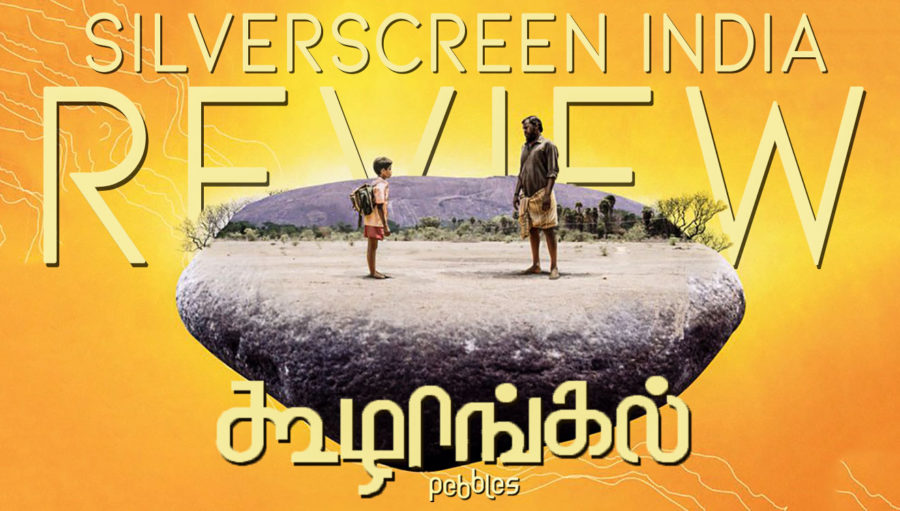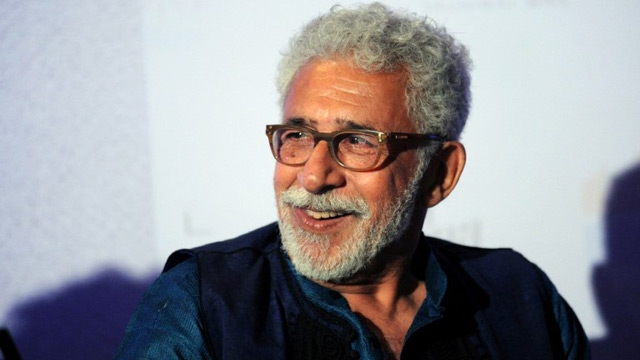Director: PS Vinothraj
Cast: Chellapandi, Karuththadaiyaan
One of the few instances where modernity makes an appearance in PS Vinothraj’s debut film Pebbles is when a little boy stops to gaze at an aeroplane ﹣ a pale white speck in the blazing sky ﹣while running away from his furious father. A second later, the father catches up, grabs the boy by his collar and brings his senses back to the ground, the vast sweltering landscape lined by swathes of bush and rocks. Another instance comes towards the end of the film where a crushed cola bottle and a pup chewing on it wander into the frame. These objects quietly signify a way of life that exists far away from the characters, geographically as well as in spirits.
Pebbles, produced by Nayanthara and Vignesh Shivan, is set around a man and his son in a parched rural region in Tamil Nadu. They set out for a neighbouring village at the beginning of the film, to meet the estranged mother who had left them in protest against the man’s alcoholism and force her to return home. The journey cannot go smooth for there is a great deal of discord between the father and the son. The man is angry, not just with his family but at the world. The boy is hurt for he misses his little sister whom he hasn’t seen in a while.
The narrative shows no urgency to get into the central story. There is no conventional story with a beginning, middle and an end. The film finds many micro-stories on the road. The aforementioned pup has a piece of thread around its neck ﹣a sign that it once had a master and a home. In the bus the lead characters board, most of the passengers are carrying something dearly. A brass lamp wrapped in a plastic sheet. A figurine. A sleeping infant on the lap of a young mother. A woman boards the bus with a pot of water and complains when the conductor charges a freight fee. The boy has something too. Assorted gifts for his sister. A ragged doll. Some uninflated balloons. The landscape is barren but life thrives despite it.
The main story blends into this narrative mosaic. Vinothraj approaches the film like a still photographer. He doesn’t hammer down a political statement or a philosophy but pins down the elusive poetry in the gentlest of the sights. He has an eye for atmospheric details such as the cadence of the man’s shoulder muscles, the precision of an old rat-huntress’ movements or the safety-pin nestled against a woman’s necklace.
Although it is apparent that the film’s essence is the region’s water scarcity, Vinothraj artfully relegates the subject to the background of the proceedings until the final segment where a long dialogue-less passage animates the ordeal of life. But you see the effect of drought everywhere in the film, like poverty, hunger and violence. It is an interesting narrative choice that frees the film of an outsider’s gaze that reduces places and people into clinical media reports. The only time this approach mildly breaks is when the father, exhausted from the long lonely walk, comes across strange voices and apparitions on the road. A reiteration of an urban misconception about the exotic countryside.
The film’s emotional core is made of the boy’s longing for his mother and little sister. Unlike his father whose behaviour is predictable, steered only by his anger, the boy is quiet and thoughtful. He has an inner rhythm that the roughness of the terrain and the cruelty of his father cannot break. Nothing misses his little inquisitive eyes ﹣a flowering shrub, an abandoned piece of mirror or the unjustness of his father’s anger. He looks, he sees.
The camera, mostly handheld, sometimes goes in circles, elaborating on the environment. The characters move in a circular trajectory too. The father and the son, eventually, come back to the place they had begun their journey. Neither they nor the viewers meet the mother. But they meet other women who must lead innocuously similar lives as her. Women who are tired of the recklessness of the men around them. Women who would patiently wait by the region’s only waterhole for hours to collect some mud-coloured water and keep their family alive. Are people interchangeable? Maybe in a place where the identity of human beings is closely attached to the function they are expected to perform.
Recommended
Pebbles is part of a new wave happening on the peripheries of Tamil cinema where young filmmakers with little or no experience in filmmaking are coming up with stunning experiments in cinema. Vinothraj’s film is a little bit of everything ﹣ a comedy, a road-movie, a drama about a dysfunctional family ﹣and at the same time, none of these but a collection of photographs that tell the story of a landscape. A meticulous execution of an idea that is hard to pierce through.
****
Pebbles was screened at the International Film Festival Rotterdam 2021.
****
The Pebbles review is a Silverscreen original article. It was not paid for or commissioned by anyone associated with the film. Silverscreenindia.com and its writers do not have any commercial relationship with movies that are reviewed on the site.



